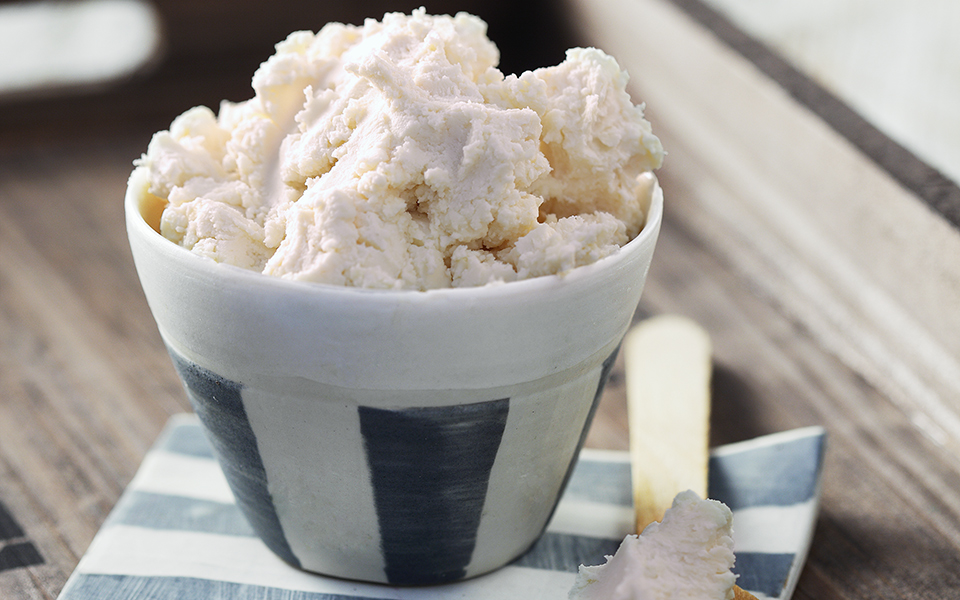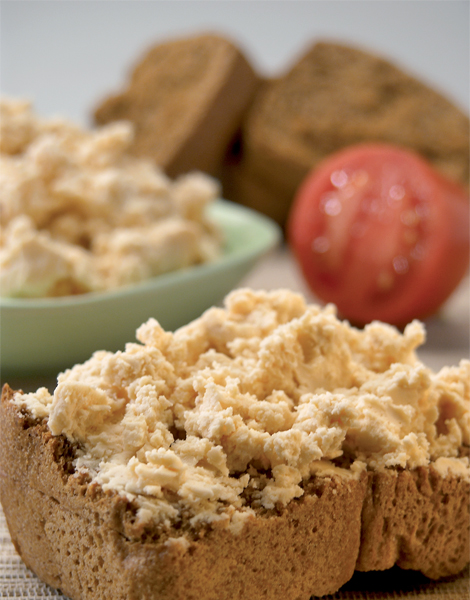Despotiko: A Remote Sacred Island in the Cyclades
New excavations shed light on an...

Kopanisti is produced in small batches across the Cyclades, but also via cottage industries.
Kopanisti is a spicy cheese with a pungent, intense peppery taste, reminiscent of Roquefort and Munster-Géromé but also distinct, since it has no particular shape and is spreadable, with a characteristic tan and, sometimes, a pale pink color that darkens as it matures. The most famous of these cheeses is Kopanisti of Mykonos island, followed by that from the islands of Tinos, Andros, Syros and Kythnos. It is also found on Astypalaia and Chios. The cheese is considered a luxury, since it takes 100 kilos of milk to make only 8 kilos of cheese.

Kopanisti can be consumed on wheat rusks with tomato, olive oil and oregano.

Kopanisti has a characteristic tan and, sometimes, a pale pink color that darkens as it matures.
HOW IT’S MADE
A mixture of cow, goat and sheep milk is used, with the quantities adjusted depending on whether the cheese will be buttery, sour, soft or sweet. The curds and whey are separated and the curds left to drain in cloths. After kneading them with salt, they are left to drain again. Then they are hung in a humid environment until a thin film of mold forms on the surface. The cheese is kneaded again to spread the mold evenly through the cheese for the maturing process. This is repeated 3-4 times.
This process, which usually takes 30-40 days, is responsible for the intense taste of the cheese. The climate of the Cyclades is also said to play a role, with the milk produced in April and May considered the best for making this cheese. It is produced in small batches across the Cyclades, but also via cottage industries.
When made at home in Mykonos, the islanders don’t always begin with milk. Sometimes a soft cheese, Tyrovolia, is used as the base to which a little old Kopanisti is added – the “mother”, which quickly converts the base cheese into Kopanisti. The best cheese, according to the old-timers, is the one that has been exposed to a little sunshine, since it accelerates fermentation and strengthens the flavor.
• In the summer, islanders consume it with Mostra ‒ wheat rusks from Mykonos ‒ tomato, olive oil and oregano. The tomato and olive oil curb the overwhelming flavor. • Other techniques islanders use to tame the intense flavor are to mix the cheese with lard, olive oil, butter or cream to then be used as a salad dressing, pasta sauce or a spread. • Add a spicy note to pies containing leeks, mushroom, onions or pumpkin by adding a little of the cheese. • The cheese goes well with fruit such as grapes, figs and pears. • Kopanisti makes an ideal partner for Raki or Ouzo, as well as sweet sparkling wines.
UNKNOWN TO MANY
A straw poll of friends and acquaintances showed that even in Greece, few people have heard of Kopanisti and even fewer have tried it. To remedy this, researcher and writer Dimitris Rousounelos recently organized a weekend on Mykonos dedicated to the cheese, with support from the island’s municipality and local chefs. “Look at how many things you can do with our Kopanisti” exclaimed a happy local attending the culinary demonstrations across the two days. Kopanisti is not likely to be an everyday cheese thanks to its powerful taste and small production levels. Milk is scarce on the Cycladic islands. As a luxury product however, it has the potential to enter most households and be showcased at more restaurants, primarily in Mykonos and other Cycladic islands.
It’s worth checking at most delis that sell a variety of cheeses from around Greece ‒ there’s a good chance they’ll carry Kopanisti too. You can also find it in: • Large branches of the Greek supermarket Sklavenitis • Miran, 45 Evripidou, Athens, tel: (+30) 210.321.7187 • Butcher Shop, 19 Persephonis, Gazi, Athens, tel: (+30) 210.341.3440
New excavations shed light on an...
On Mykonos, this simple yet vibrant...
Discover hidden beaches, authentic tavernas, ancient...
Discover Greece’s islands in September with...